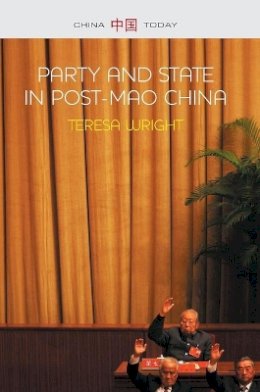
Stock image for illustration purposes only - book cover, edition or condition may vary.
Party and State in Post-Mao China
Teresa Wright
€ 79.81
FREE Delivery in Ireland
Description for Party and State in Post-Mao China
Hardback. In recent decades, China has become a quasi-capitalist economic powerhouse. Yet it continues to be ruled by the same Communist Party-dominated government that has been in power since 1949. Series: China Today. Num Pages: 200 pages. BIC Classification: 1FPC; JP. Category: (P) Professional & Vocational. Dimension: 217 x 149 x 24. Weight in Grams: 430.
In recent decades, China has become a quasi-capitalist economic powerhouse. Yet it continues to be ruled by the same Communist Party-dominated government that has been in power since 1949. But how has China’s political system achieved such longevity? And what does its stability tell us about the future of authoritarian versus liberal democratic governance?
In this detailed analysis of the deeply intertwined relationship between the ruling Communist Party and governing state, noted China expert Teresa Wright provides insightful answers to these important questions. Though many believe that the Chinese party-state has maintained its power despite its communist and authoritarian features, Wright argues that the key to its sustained success lies in its careful safeguarding of some key communist and authoritarian characteristics, while simultaneously becoming more open and responsive to public participation. She contends that China’s post-Mao party-state compares well to different forms of political rule, including liberal democratic government. It has fulfilled the necessary functions of a stable governing regime: satisfying key demographic groups and responding to public grievances; maintaining economic stability and growth; and delivering public services - without any real reduction in CCP power and influence.
Questioning current understandings of the nature, strengths, and weaknesses of democracy and authoritarianism, this thought-provoking book will be essential reading for all students and scholars of Chinese politics and international relations.
In this detailed analysis of the deeply intertwined relationship between the ruling Communist Party and governing state, noted China expert Teresa Wright provides insightful answers to these important questions. Though many believe that the Chinese party-state has maintained its power despite its communist and authoritarian features, Wright argues that the key to its sustained success lies in its careful safeguarding of some key communist and authoritarian characteristics, while simultaneously becoming more open and responsive to public participation. She contends that China’s post-Mao party-state compares well to different forms of political rule, including liberal democratic government. It has fulfilled the necessary functions of a stable governing regime: satisfying key demographic groups and responding to public grievances; maintaining economic stability and growth; and delivering public services - without any real reduction in CCP power and influence.
Questioning current understandings of the nature, strengths, and weaknesses of democracy and authoritarianism, this thought-provoking book will be essential reading for all students and scholars of Chinese politics and international relations.
Product Details
Format
Hardback
Publication date
2015
Publisher
John Wiley and Sons Ltd United Kingdom
Number of pages
200
Condition
New
Series
China Today
Number of Pages
200
Place of Publication
Oxford, United Kingdom
ISBN
9780745663845
SKU
V9780745663845
Shipping Time
Usually ships in 7 to 11 working days
Ref
99-50
About Teresa Wright
Teresa Wright is Professor and Chair in the Department of Political Science at California State University, Long Beach
Reviews for Party and State in Post-Mao China
"Much more than a textbook, this study is a sustained treatment of governance and political stability in China. In it, Teresa Wright provocatively suggests that the current regime, despite the many challenges it faces, may last longer than we think, not least because it has already carried out reforms that make it more "democratic," or at least accountable to the populace in ways that do not require free and fair elections." Kevin J. O'Brien, University of California, Berkeley "Teresa Wright is one of the most eloquent writers on contemporary China, and this book shows her at her best. By describing how political power is organized, obtained, and used in China, she is able to explain a key paradox of China today: how a regime can be authoritarian, lacking the rights and freedoms that many in the West take for granted, and at the same time legitimate in the eyes of many Chinese. Whereas many outside observers consider repression to be the main source of the Communist Party?s staying power, Wright shows how producing economic growth and political order, providing necessary goods and services, and addressing the changing wants and needs of an evolving society are also part of the solution to the puzzle of stable authoritarianism in China." Bruce Dickson, George Washington University
